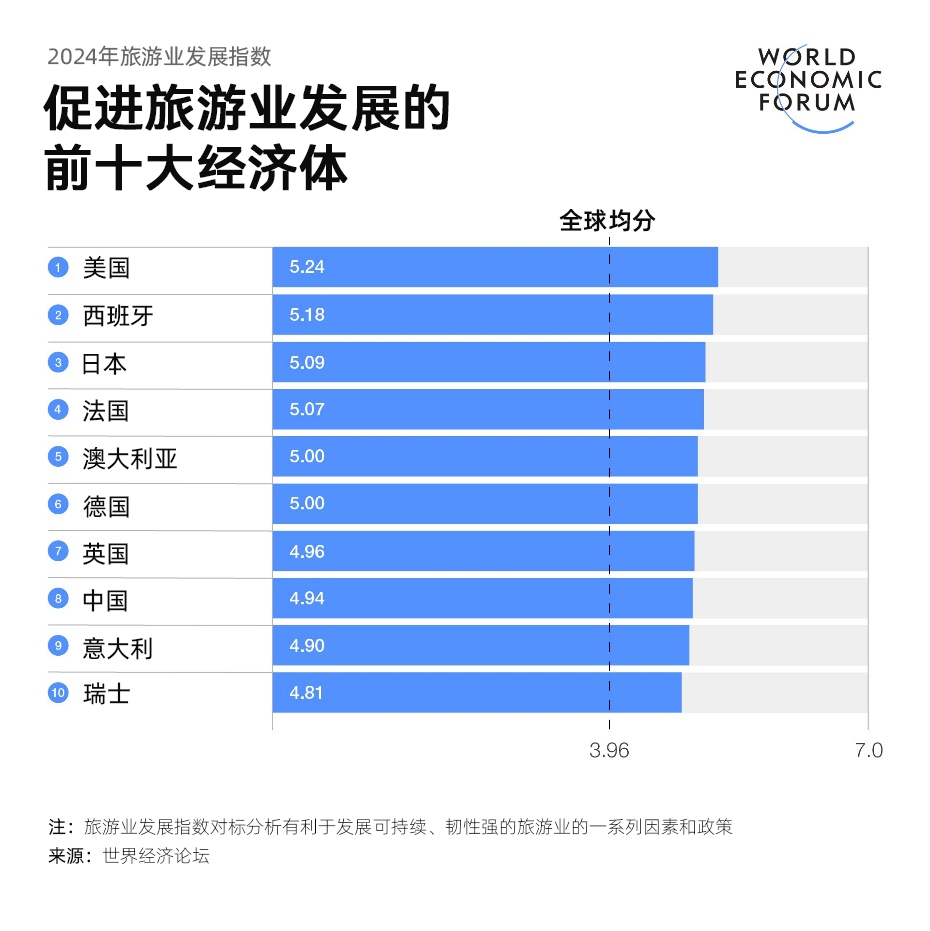High-income economies in Europe and the Asia-Pacific region continue to lead the World Economic Forum’s Travel & Tourism Competitiveness Index, with the U.S., Spain, and Japan once again ranking in the top three.
Global tourism has rebounded after the pandemic, but continues to face complex and intertwined challenges. Recovery levels also vary significantly across regions, with the overall score showing only a modest improvement compared to 2021.
Developing economies are making rapid progress—out of the 71 economies that have shown improvement since 2019, 52 are classified as developing economies. However, these economies still require substantial investment to narrow the gap and increase their market share.
To view the full report, please click "Read More."
The World Economic Forum’s latest tourism report, released today, reveals that with the lifting of COVID-related travel restrictions and the surge in pent-up demand, international tourist arrivals and the tourism sector’s contribution to global GDP are expected to rebound to pre-pandemic levels this year.The economies ranked highest in the 2024 Tourism Index are the United States, Spain, Japan, France, and Australia. In 2023, the Middle East region saw the fastest recovery in international tourist arrivals—growing by 20% compared to 2019—while tourism in Europe, Africa, and the Americas also staged a robust rebound, recovering roughly 90% of pre-pandemic levels.The above findings come from the "2024 Tourism Development Index" report. Published every two years, the report is jointly released by the World Economic Forum and the University of Surrey in the UK, focusing on a range of factors and policies to analyze the state of tourism development across 119 countries."Tourism can drive economic growth and empower communities through economic and social transformation—this year is set to be a pivotal moment for the industry," said Francisco Betti, Head of the Global Industry Team at the World Economic Forum. "The 2024 Tourism Development Index offers a forward-looking analysis of the current state and future prospects of tourism, equipping industry leaders with the insights needed to navigate the sector's evolving trends. By embracing sustainability, it unlocks untapped potential, benefiting communities worldwide and contributing to the prosperity of nations around the globe."
Global Recovery in the Post-Pandemic Era
Global tourism is expected to rebound from the depths of the COVID-19 pandemic and even surpass pre-pandemic levels, driven primarily by a sharp surge in global travel demand, rising flight availability, an increasingly open international environment, and growing interest—and corresponding investments—in natural and cultural attractions.However, the global recovery has shown some variation. While 71 out of the 119 economies included in the ranking have improved their scores since 2019, the global average score has risen by only 0.7% compared to pre-pandemic levels.Although the tourism industry has recovered from the shocks of the global public health crisis, it continues to face a host of external challenges, including widening macroeconomic, geopolitical, and environmental risks. Added to this are increasingly stringent regulations on sustainable industry practices, as well as the growing impact of emerging digital technologies like big data and artificial intelligence. Meanwhile, the issue of labor shortages remains unresolved, while air travel volumes, capital investments, productivity levels, and other supply conditions have yet to keep pace with surging demand. On top of these pressures, global inflation further exacerbates the imbalance, driving up prices and creating additional service-related complications.Highlights of the "2024 Tourism Development Index"
Among the 30 economies with the highest index scores in 2024, 26 were high-income economies, 19 were from Europe, 7 belonged to the Asia-Pacific region, 3 were from the Americas, and the remaining 1 (the UAE) was located in the Middle East and North Africa. The top 10 countries in 2024 were the United States, Spain, Japan, France, Australia, Germany, the United Kingdom, China, Italy, and Switzerland.The research findings indicate that high-income economies have generally maintained a more favorable environment for tourism development, characterized by a business-friendly climate, a dynamic labor market, open tourism policies, robust transportation and tourism infrastructure, as well as a comprehensive array of natural, cultural, and non-entertainment attractions.However, developing countries have made the most significant progress in recent years. Among upper- and middle-income economies, China has solidified its position within the top 10, while emerging key tourism destinations such as Indonesia, Brazil, and Turkey—alongside China—have entered the top quarter of the rankings. Looking at the bigger picture, over 70% of the countries that improved their scores since 2019 belong to lower-to-middle or upper-middle-income economies. Notably, the Middle East and North Africa, as well as Sub-Saharan Africa, have emerged as the regions experiencing the greatest gains. Among the top 10 fastest-improving economies between 2019 and 2024, only Saudi Arabia and the United Arab Emirates remain high-income economies.The report emphasizes that, despite significant progress, developing countries still need to make substantial investments to narrow the gap—both in terms of industry conditions and market share—with high-income nations. To achieve this, a viable approach is to sustainably leverage natural and cultural assets. Compared to other factors, these assets exhibit a weaker correlation with national income levels, offering developing economies a valuable opportunity to drive economic growth through tourism."Different economies have varying capacities when it comes to building a robust environment that fosters the thriving growth of tourism, and narrowing these capability gaps is crucial," said Professor Lis Tussyadiah, Dean of the School of Hospitality and Tourism Management at the University of Surrey in the UK. "Tourism holds immense potential to drive prosperity and mitigate global risks—but to fully unlock this potential, we must adopt strategic, inclusive approaches."
Addressing Future Global Challenges
According to the World Economic Forum’s *2024 Global Risks Report*, the tourism industry faces a complex array of challenges, including geopolitical uncertainties, economic volatility, inflation, and extreme weather events. Additionally, balancing growth with sustainable development remains a critical issue, exacerbated by the sector’s pronounced seasonality, overcrowding at popular destinations, and the potential for emissions to rebound to pre-pandemic levels. The report also highlights two long-standing concerns: equity and inclusivity. While tourism is a key source of relatively high-income jobs—particularly in developing countries—it continues to grapple with persistent gender inequality, especially in regions like the Middle East and North Africa, as well as South Asia.Despite the challenges outlined above, tourism itself can also serve as a powerful force in addressing these very issues. To this end, policymakers should prioritize the following policy actions: leveraging the opportunities presented by tourism to strengthen nature conservation efforts; investing in the development of a resilient, inclusive, and skilled workforce; managing both visitor behavior and infrastructure development with a strategic approach; fostering cultural exchanges between tourists and local communities; and using tourism as a tool to bridge the digital divide.Tourism has historically contributed 10% of global GDP and provided 10% of worldwide employment opportunities. If managed strategically, tourism has the potential to become a key driver in fostering global prosperity and enhancing global well-being.About the "2024 Tourism Development Index"
The "2024 Tourism Development Index" has been enhanced in several key areas, incorporating the latest data and introducing a range of newly developed indicators to assess the tourism industry's environmental and social impacts. As a result, it is less comparable to the previously released 2021 edition. This year’s report employs an updated methodology, leading to a recalibration of the 2019 and 2021 results. The data used in the report reflect the most current information available as of the end of 2023.
The Tourism Development Index stands as a significant collaboration between the Forum and industry stakeholders. The World Economic Forum is actively working alongside major industry communities to foster an inclusive, resilient, and sustainable sector ecosystem—driven by a shared vision of building a brighter, more prosperous future for all.To view the full report, please click "Read More."Feel free to share this on WeChat Moments; please leave a comment below the post if you’d like to republish.
The World Economic Forum is an independent and neutral platform dedicated to bringing together diverse perspectives to discuss critical global, regional, and industry-specific issues.
Follow us on Weibo, WeChat Video Channels, Douyin, and Xiaohongshu!
"World Economic Forum"




